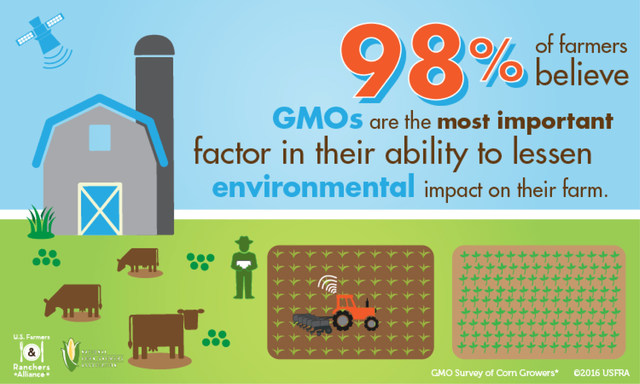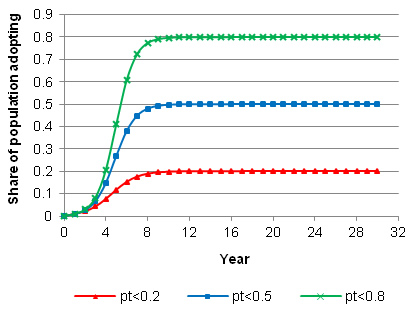Let It Be Resolved: What We’re Reading, December 2016
In January, many people make New Year’s resolutions in the hopes of trying to better themselves and live up to their potential. Looking back to December, we read many stories about the potential of GMOs. The articles that caught our attention last month talked about what GMOs do right now, what could they be doing now if fully embraced, and what they can do in the future.
Potential Environmental Benefits of GMOs
 Among the many questions that surround the issue of genetically modified organisms, one of the most basic is: What do farmers and ranchers think about GMO technology? A new survey from the National Corn Growers Association (NCGA) and U.S. Farmers and Ranchers Alliance (USFRA) of 282 farmers from across the United States set out to answer that very question. A December 20th article at AgWired notes that farmers believe GMOs can help them to grow their crops more efficiently and help reduce their environmental impact. In fact, “when asked about farmers’ ability to lessen their environmental footprint, GMO seeds ranked top of the list (98%).”
Among the many questions that surround the issue of genetically modified organisms, one of the most basic is: What do farmers and ranchers think about GMO technology? A new survey from the National Corn Growers Association (NCGA) and U.S. Farmers and Ranchers Alliance (USFRA) of 282 farmers from across the United States set out to answer that very question. A December 20th article at AgWired notes that farmers believe GMOs can help them to grow their crops more efficiently and help reduce their environmental impact. In fact, “when asked about farmers’ ability to lessen their environmental footprint, GMO seeds ranked top of the list (98%).”
Other key findings from the survey include:
- 87 percent of producers said GMO seeds allow them to reduce their pesticide and herbicide usage;
- 64 percent said GMO seeds allow for efficient management of resources, specifically, fuel, time and less wear-and-tear on their equipment;
- 78 percent foresee increased environmental impacts, including an increase in water usage and application of pesticides, if GMO seeds were not to be available to them as a choice in crop production;
- 92 percent of those surveyed have been using GMO seeds for 10 or more years, and grow a variety of crops, including corn, soybeans, alfalfa, and cotton.
For more details about the survey, please visit the Food Dialogues website, and click here to listen to an interview with a Maryland farmer about the survey, including why he believes GMOs help make farms more sustainable.
Potential Food Security Benefits With GMOs
At a recent event in Los Angeles at the Museum of Contemporary Art, a panel debated this very question. Are GMOs controversial? Three food and agricultural experts argued that they shouldn’t be. The event, co-sponsored by UCLA and Zócalo Public Square, was a lively discussion about the intertwining issues of GMOs, food, and the environment, moderated by "the fairy Godmother of the LA food scene" and KCRW/NPR personality Evan Kleinman.

One of the panelists, UCLA molecular biologist Bob Goldman noted, “Can you in fact feed the 9 billion people we’ll have by 2050…and how do you do that with minimal ecological impact? I think the way to do that is through food science.”
Moving on to the question of safety, panelist Edward Parson, a co-director of the Emmett Institute
on Climate Change and the Environment at UCLA, pointed out that “The usual concerns about GMOs—that they might be unhealthy, or that they hurt the environment—have not been borne out
after more than a quarter century of growing GMO crops in North America.”
The event generated a broad discussion among audience members. To read more about this event, check out the write-up at the Zócalo Public Square website.
Achieving GMOs Full Potential
 We’ve talked a bit about ways in which GMOs currently help farmers and aid food security. But there’s still some big “What If?” questions. What if activists hadn’t so forcefully opposed the technology? What if GMOs with health benefits were available? What if regulations weren’t strangling innovation? What if consumers embraced GE technology like they have with other food advances? What if a product didn’t take so much time and so much money to bring to market?
We’ve talked a bit about ways in which GMOs currently help farmers and aid food security. But there’s still some big “What If?” questions. What if activists hadn’t so forcefully opposed the technology? What if GMOs with health benefits were available? What if regulations weren’t strangling innovation? What if consumers embraced GE technology like they have with other food advances? What if a product didn’t take so much time and so much money to bring to market?
A new study by David Zilberman and Scott Kaplan of University of California, Berkeley and Justus Wesseler of Wageningen University attempts to quantify the cost of underutilizing GE technology, and presents several case studies to illustrate their findings.
The authors use the examples of Golden Rice, along with commodity staples of corn, wheat, and rice to calculate potential loss. The conclusions:
- Several million people have lost their eyesight due to the delay of introduction of Golden Rice
- Losses in social welfare between $50 and $97 billion due to the lack of availability of GE corn in some areas, along with the lack of any commercially available GE wheat or rice
- Losses in innovation due to bans and regulation
- Losses in the fight against climate change due to low adoption numbers worldwide
The authors write that these conclusions are conservative and note that “various opponents of the technologies and society as a whole need to seriously think about whether the gain from the delays in the introduction and bans on the use of GMOs justify the potential gains from its use.”
To read more about this study, and to view specific methodologies, please read the study at the journal AgBioForum’s website.
GMOs Future Potential
A December 23rd piece at The Conversation discusses potential worldwide water shortages in the upcoming century. One of the most pressing issues facing the world in the near future is the ability to grow more food for a rapidly growing world population, while facing the possibility of water scarcity. One potential solution is desalinating ocean water, but the cost of doing this on a wide scale is still prohibitive. The other solution that the author suggests is the use of plant science to develop crops that need less water to thrive. A significant part of this fix is plant science utilizing genetic engineering.
 And as the author notes, “Farmers traditionally bred drought tolerant crops through the slow and painstaking process of selection and crossing over many generations. Genetic engineering (GE) provides a short-cut.”
And as the author notes, “Farmers traditionally bred drought tolerant crops through the slow and painstaking process of selection and crossing over many generations. Genetic engineering (GE) provides a short-cut.”
While GMO technology remains a controversial topic for some, scientists are showing that it can be an integral part of being a solution to many of the issues the world may face in the future. To read more about how biotechnology can help to develop drought-tolerant plants, please visit The Conversation website.
If you choose to make them, we hope you are successful in your maintaining your New Year’s resolutions. In 2017, we resolve to continue answering your questions about GMOs and making information about GMOs in food and agriculture easier to access and understand.
For more information about GMOs, feel free to explore the GMO Answers website.



